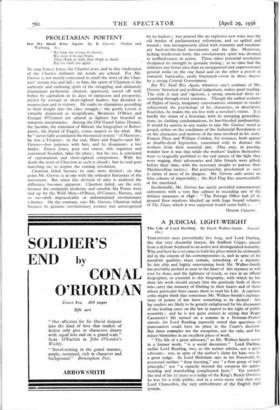PROLETARIAN PORTENT
"We bear the wrong in silence, We store it in our brain.
They think us dull, they think us dead, But we shall rise again . . ."
So sang Ernest Jones, the Chartist poet, and in this vindication of the Chartist militants his words are echoed. For Mr. Groves is not merely concerned to retell the story of the Char- tists' stormy rise and fall ; to him, the spirit of Chartism is the authentic and enduring spirit of the struggling and ultimately triumphant proletariat, cheated, oppressed, staved off with bribes by capitalism in its days of expansion and prosperity, misled by corrupt or short-sighted leaders, but destined to resurrection and to victory. He ranks its champions according to their insight into the class struggle ;- the gentle Lovett is virtually dismissed as insignificant, Bronterre O'Brien and Feargus O'Connor are sainted as fighters but branded as romantic reactionaries. Among the Old Guard Julius Harney, the Jacobin, the translator _of Babeuf, the biographer of Robes- pierre, the friend of Engels, comes nearest to the ideal. But he" never fully assimilated the theoretical system "of Marxism ; he was a Utopian ; in the end, Marx and Engels—and Mr. Groves—lose patience with him, and he disappears, a lost leader. Ernest Jones, poet and orator, able organiser and convinced 'Socialist, takes his place; but he; too, is convicted of opportunism and short-sighted compromise. With his death the story of Chartism as such is closed ; but its soul goes marching on, to inspire the coming revolution.
Chartism failed because its aims were divided ; on that point Mr. Groves is at one with the orthodox historians of the movement. But when this division of aims is analysed the difference _becomes apparent._ Chartism failed, say the rest, because the eminently . moderate and sensible Six Points were tied up by the Wild Men—O'Brien, O'Connor, Harney, and so on—with impracticable or unformulated revolutionary szhemes. On the contrary, .says Mr. Groves, Chartism failed because its genuine revolutionary essence was unrecognised
by its leaders ; was poured like an explosive new wine into the old bottles of parliamentary reformism, and so spilled and wasted ; was incongruously allied with romantic and reaction- ary back-to-the-land movements and the like. Moreover, lacking intellectual form, this revolutionary spirit was doomed to ineffectiveness in action. Three times potential revolution dissipated its strength in sporadic rioting ; at no time had the militants any better idea than an unorganised and unprovisioned general strike on the one hand and on the other a putsch of romantic barricades, easily frustrated—even in those days— by a strong Central Government.
But We Shall Rise Again, whatever one's estimate of Mr. Groves' historical and political judgement, makes good reading. The style is taut and vigorous, a strong emotional drive re- sounding through every sentence. Though the author eschews all flights of fancy, imaginary conversations, attempts to render subjectively the psychology of his characters, or descriptive flourishes, he makes the era live with a novelist's vision. It is hardly the vision of a historian, with its sweeping generalisa- tions, its slashing condemnations, its hot-blooded partisanship. It would be unwise in any reader to take Mr. Groves' word as gospel, either on the conditions of the Industrial Revolution or on the characters and motives of the men involved in his story. Francis Place and William Cobden, for instance, both appear' as double-dyed hypocrites, concerned only to distract the workers from their essential aim. (One may, in passing, wonder how it was that while the workers' leaders themselves were so tragically purblind to the real nature of the fight they were waging, their adversaries and false friends were gifted, before their time, with the necessary insight to pursue their Machiavellian tactics.) But partisanship proclaimed as such is shorn of most of its dangers. Mr. Groves sails under no false colours of impartiality ; the Red Flag flies unconcealedly at his masthead.
Incidentally; Mr. Groves has surely provided contemporary cartoonists with a very fine subject in recording one of the defence measures of 1848: "The Foreign Office had all its ground floor windows blocked up- with huge bound volumes of The Times, which it was supposed would resist bulle:s . . .
HONOR CROOM E.


























































 Previous page
Previous page